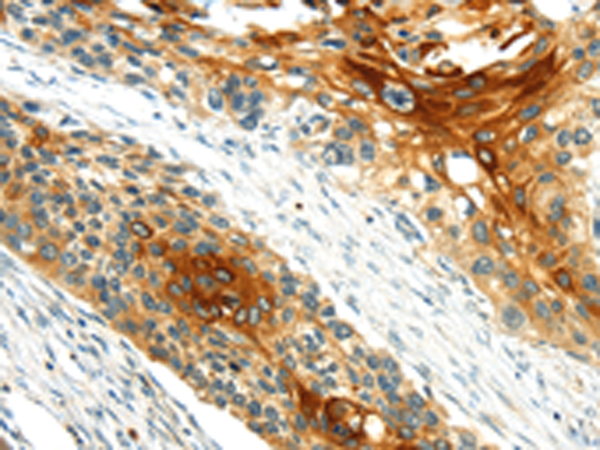

| WB | 咨询技术 | Human,Mouse,Rat |
| IF | 咨询技术 | Human,Mouse,Rat |
| IHC | 1/10-1/50 | Human,Mouse,Rat |
| ICC | 技术咨询 | Human,Mouse,Rat |
| FCM | 咨询技术 | Human,Mouse,Rat |
| Elisa | 1/1000-1/2000 | Human,Mouse,Rat |
| Aliases | ASH; Grb3-3; MST084; NCKAP2; MSTP084; EGFRBP-GRB2 |
| Host/Isotype | Rabbit IgG |
| Antibody Type | Primary antibody |
| Storage | Store at 4°C short term. Aliquot and store at -20°C long term. Avoid freeze/thaw cycles. |
| Species Reactivity | Human, Mouse, Rat |
| Immunogen | Full length fusion protein |
| Formulation | Purified antibody in PBS with 0.05% sodium azide and 50% glycerol. |
+ +
以下是3篇关于GRB2抗体的参考文献概览:
1. **"GRB2: A pivotal adapter protein in cellular signaling"**
- **作者**: Lowenstein, E. J., et al.
- **摘要**: 该研究利用特异性GRB2抗体,通过免疫共沉淀和免疫印迹技术,揭示了GRB2通过SH2/SH3结构域介导生长因子受体(如EGFR)与下游Ras/MAPK信号通路的连接机制,强调了其在细胞增殖和分化中的核心作用。
2. **"Targeting GRB2 in HER2-positive breast cancer: Therapeutic implications"**
- **作者**: Li, N., et al.
- **摘要**: 通过GRB2抗体阻断实验,研究发现HER2阳性乳腺癌细胞中GRB2与HER2受体的异常结合促进了肿瘤生长。抗体抑制GRB2功能可显著降低下游ERK和PI3K通路的活性,提示其作为治疗靶点的潜力。
3. **"GRB2 expression correlates with prognosis in colorectal cancer"**
- **作者**: Wang, Y., et al.
- **摘要**: 使用GRB2特异性抗体进行免疫组化分析,发现结直肠癌组织中GRB2高表达与患者不良预后及转移风险增加相关,表明GRB2可能作为癌症进展的生物标志物。
这些文献均以GRB2抗体为工具,分别从信号机制、癌症治疗靶点和临床预后角度展开研究。如需具体文章链接或补充信息,可进一步提供研究方向。
GRB2 (Growth factor receptor-bound protein 2) is a crucial adaptor protein involved in intracellular signal transduction, particularly within the receptor tyrosine kinase (RTK)/Ras/mitogen-activated protein kinase (MAPK) signaling pathway. It plays a pivotal role in linking activated cell surface receptors, such as EGFR and insulin receptor, to downstream effector molecules by recruiting guanine nucleotide exchange factors (e.g., SOS1) via its SH3 domains. Structurally, GRB2 contains one Src homology 2 (SH2) domain flanked by two SH3 domains, enabling interactions with phosphorylated tyrosine residues on receptors and proline-rich motifs on signaling partners, respectively.
GRB2 antibodies are essential tools for studying its expression, localization, and function in both physiological and pathological contexts. These antibodies are widely used in techniques like Western blotting, immunoprecipitation, and immunofluorescence to detect GRB2 protein levels, assess post-translational modifications, or investigate protein-protein interactions. Dysregulation of GRB2-mediated signaling has been implicated in cancer progression, immune disorders, and metabolic diseases, making GRB2 antibodies valuable for research into therapeutic targeting. For instance, elevated GRB2 expression correlates with tumor growth and metastasis in certain cancers. Commercially available GRB2 antibodies are typically validated for specificity across human, mouse, and rat samples, with monoclonal and polyclonal variants offering flexibility for diverse experimental designs. Proper validation using knockout controls or peptide blocking is critical to ensure antibody reliability in downstream applications.
×